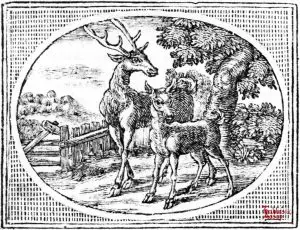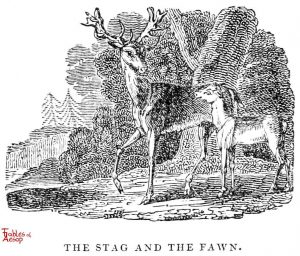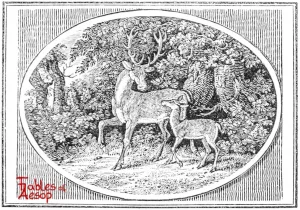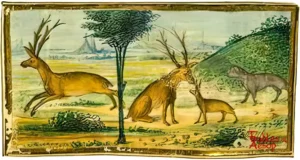A Fawn questioned larger deer about why they flee a Dog when they are so much bigger. Nobody could answer; it was just in their nature the Fawn was told.
A coward by nature will always be a coward.
A young Fawn was curious about why adult deer feared hounds. He asked his Mother: “You are larger, faster, and have horns; why do hounds frighten you?” She answered: “All you say is true, but it’s built into my nature that at the bark of a single dog I feel faint and run away as fast as I can.”

Townsend version
A young fawn once said to his Mother, “You are larger than a dog, and swifter, and more used to running, and you have your horns as a defense; why, then, O Mother! do the hounds frighten you so?” She smiled, and said: “I know full well, my son, that all you say is true. I have the advantages you mention, but when I hear even the bark of a single dog I feel ready to faint, and fly away as fast as I can.”
Moral
No arguments will give courage to the coward.

JBR Collection (The Stag and The Fawn)
A Fawn once said to a Stag, “How is it that you, who are so much bigger, and stronger, and fleeter than a Dog, are in such a fright when you behold one? If you stood your ground, and used your horns, I should think the Hounds would fly from you.” “I have said that to myself, little one, over and over again,” replied the Stag, “and made up my mind to act upon it; but yet, no sooner do I hear the voice of a Dog than I am ready to jump out of my skin.”

Samuel Croxall (The Stag and the Fawn)
A STAG, grown old and mischievous, was, according to custom, stamping with his foot, making offers with his head, and bellowing so terribly, that the whole herd quaked for fear of him: when one of the little Fawns coming up, addressed him to this purpose: Pray, what is the reason that you, who are so stout and formidable at all other times, if you do but hear the cry of the hounds, are ready to fly out of your skin for fear? What you observe is true, replied the Stag, though I know not how to account for it: I am indeed vigorous and able enough, I think, to make my party good any where, and often resolve with my self, that nothing shall ever dismay my courage for the future: but, alas! I no sooner hear the voice of a hound, but all my spirits fail me, and I cannot help making off as fast as my legs can carry me.
THE APPLICATION
This is the case oF many a cowardly bully in the world. He is disposed to be imperious and tyrannical, and to insult his companions, and takes all opportunities of acting according to his inclinations; but yet is cautious where he makes his haunts, and takes care to have to do only with a herd of rascally people, as vile and mean as himself. A man of courage quashes him with a word; and he who has threatened death in every sentence, for a twelvemonth together, to those whom he knew it would affright, at the very frown of an intrepid man, has leapt out of a window. It is no unpleasant sight, to be present when any of these gentlemen happen, to be disarmed of their terror before the face of their humble admirers: there is a strange, boisterous struggle, betwixt fear, shame, and revenge, which blinds them with confusion, and though they would fain exert a little courage, and show themselves men, yet, they know not how, there is something within which will not suffer them to do it. The predominance of nature will show itself upon occasion, in its true colours, through all the disguises which artful men endeavour to throw over it. Cowardice, particularly, gives us but the more suspicion, when it would conceal itself under an affected fierceness; as they, who would smother an ill smell by a cloud of perfume, are imagined to be but the more offensive. When we have done all, nature will remain what she was, and show herself whenever she is called up; therefore whatever we do in contradiction to her laws is so forced and affected, that it must needs expose, and make us ridiculous. We talk nonsense when we would argue against it; like Teague, who being asked, Why he fled from his colours? said, His heart was as good as any in the regiment, but protested his cowardly legs would run away with him, whatever he could do.

Thomas Bewick (The Stag and The Fawn)
A Stag, grown old and mischievous, was, according to custom, stamping with his foot, making threatening motions with his head, and bellowing so terribly, that the whole herd quaked for fear of him; when one of the little Fawns coming up, addressed him to this purpose: Pray what is the reason that you, who are so stout and formidable at all other times, if you do but hear the cry of the hounds, are ready to fly out of your skin for fear? What you observe is true, replied the Stag, though I know not how to account for it: I am indeed vigorous and able enough, I think, to defend myself against all attacks, and often resolve with myself, that nothing shall ever dismay my courage for the future; but, alas! I no sooner hear the voice of the hounds, but all my spirits fail, and I cannot help making off as fast as my legs can carry me.
APPLICATION.
Try what we can, do what we will, Yet nature will be nature still.
The predominance of nature will generally shew itself through all the disguises which artful men endeavour to throw over it. Cowardice particularly gives us but the more suspicion of its existence, when it would conceal itself under an affected fierceness, as they who would smother an ill smell by a cloud of perfume, are imagined to be but the more offensive. When we have done all, nature will remain what she was, and shew herself whenever she is called upon: therefore, whatever We do in contradiction to her laws, is so forced and affected, that it must needs expose and make us truly ridiculous.
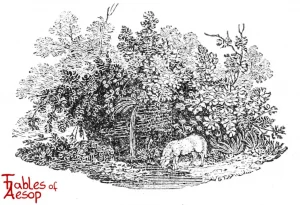

L’Estrange version (A Fawn and a Stag)
A fawn was reasoning the matter with a stag, why he should run away from the dogs still; for, says he, you are bigger and stronger then they. If you have a mind to stand, y’are better arm’d; and then y’are fleeter if you’ll run for’t. I can’t imagine what should make you so fearful of a company of pityful currs. Nay, says the stag, ’tis all true that you say, and ’tis no more then I say to my self many times, and yet whatever the matter is, let me take up what resolutions I please, when I hear the hounds once, I cannot but betake my self to my heels.
Moral
‘Tis one thing to know what we ought to do, and another thing to execute it; and to bring up our practice to our philosophy: he that is naturally a coward is not to be made valiant by councell.

Gherardo Image from 1480

Cervus et Hinnulus Eius
Cervus, praegrandi corpore et qui cornua habuit ingentia, per silvas grassabatur. Cui hinnulus accedens inquit, “Mi pater, pro miraculo mihi est quod, cum sis tam praegrandi corpore et cornua habeas tam praeclara, te latratus canum exhorrescere.” Cui cervus, “Mi fili, magnum habeo, fateor, corpus et cornua comparia, sed sane cor pusillum.”
Moral
Fabula indicat magno camino parvulum non suffecturum ignem.
Perry #351
